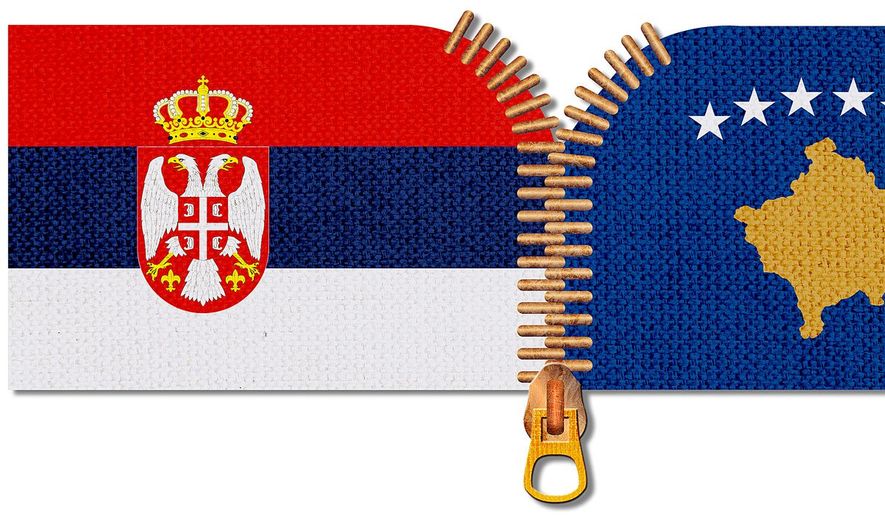OPINION:
Brussels insists Serbia normalize relations with Kosovo before it can join the European Union (EU). So far 114 countries have recognized Kosovo’s independence. However, Serbia campaigns against Kosovo’s efforts to gain greater global recognition. It also supports parallel private structures in North Kosovo, which undermine Kosovo’s sovereignty and foment unrest among Kosovo Serbs. The Kosovo-Serbia conundrum can be solved with more effective international mediation. Diplomacy works best when Europe and the United States work together.
Recent statements by Serbian President Aleksandar Vucic give rise to optimism. He called on the Serbian nation to “stop burying its head in sand” on the issue of Kosovo, and start “an internal dialogue.” He told Serbs “to be realistic.”
A grand bargain may be in the works. While normalization starts by addressing many bilateral issues, it all comes down to Serbia’s recognition of Kosovo’s independence. Recognition would lead to Kosovo’s membership in the United Nations. Kosovo and Serbia would negotiate the EU’s membership criteria, ultimately entering the EU at the same time.
A framework for negotiations already exits. The Kosovo-Serbia dialogue was launched by the EU in 2011. Kosovo and Serbia finalized agreements on technical issues such as freedom of movement, integrated border management, and license plates. However, implementation has been uneven. The 2013 Brussels Agreement affirmed a “European future” for Kosovo and Serbia. At best, there is patchy progress on the political track.
Existing agreements must be enforced. The EU should suspend its mediation if either side stonewalls its commitments. An official EU Monitoring Mechanism would report to member states via the Political Security Committee of the EU Council.
The EU should condition funds provided to Kosovo and Serbia through its Instrument for Pre-Accession Assistance Program. “No progress, no chapters” would be the guiding principle, linking progress in the Kosovo-Serbia dialogue to Serbia’s EU aspirations.
Mediators need an end game to their diplomacy. The Nobel Peace Prize recipient, Martti Ahtisaari, who served as U.N. special envoy from 2005 to 2008, knew the outcome of his efforts before taking the job. Today’s mediators need strategic and moral clarity.
A new format could galvanize negotiations. The EU should appoint an international heavyweight as special envoy. Wolfgang Schauble, Germany’s finance minister, has clout and negotiating experience. He would be formidable in this role. Given her overall experience and work in the Balkans as U.S. secretary of State, Condoleezza Rice would be ideal as the U.S. special representative.
Dialogue cannot be open-ended. Mediators should set a deadline of 18 months. The clock would start ticking when the dialogue is upgraded and relaunched.
The people of Kosovo and Serbia must be kept informed. The Kosovo and Serbia delegations could include a “unity team,” comprised of major political parties and civil society representatives.
A deal won’t be easy. There is a plethora of bilateral issues to be addressed. There are up 1,500 missing persons from the war. A Regional Commission for Facts about War Crimes could help assuage the families of victims. An estimated $1.5 billion in Kosovo pension funds and a $600,000 privatization fund were seized by Serbia. In turn, Serbia wants to recover the value of its investments in Kosovo. A compensation plan is needed. Kosovo needs a comprehensive plan to integrate Kosovo Serbs, while providing local autonomy to enhance minority rights.
The United States has an interest in brokering a deal between Kosovo and Serbia. Kosovo is on the front line of Russia’s new cold war with the West. Moscow has been transferring sophisticated weapons to Serbia, including MIG-29 fighter aircraft, T-72 battle tanks, and BUK surface-to-air missiles. In December, a Russian-made train emblazoned with the message “Kosovo is Serbian” in 20 languages was stopped by Kosovo authorities at the border. The ensuing war of words almost spiraled into a violent confrontation.
Lack of progress has a negative impact in both Kosovo and Serbia. Failure to fully integrate into the international system undermines Kosovo’s economy, which suffers from 30 percent unemployment and even higher youth unemployment. Lack of economic development has fueled an underground economy. Criminality, corruption and cronyism are widespread in the region.
Denial of visa liberalization for Kosovo citizens has made them disillusioned with the West. Islamism is on the rise. Scores of Kosovo Albanians joined the Islamic State in Iraq and Syria. With financing from Turkey, the biggest mosque in the Balkans is planned for Pristina, Kosovo’s capital.
Serbia is stigmatized by its genocidal practices during the 1990s. It remains a borderline failed state, caught between its dark history, European aspirations and Russia’s nefarious influence. Absent economic reforms, Serbia has become a hub for organized crime and all sorts of trafficking. North Kosovo is run by a criminal gang under Belgrade’s control. A mutually symbiotic relationship exists between gangs in North Kosovo and their mafia counterparts in Serbia and the region.
Serbia wants to gain EU membership as soon as it normalizes relations with Kosovo. Would Euro-Atlantic integration solve Serbia’s problems with Kosovo? Can Serbia deliver Russia’s agreement for Kosovo to join the U.N.? Would Serbia block Kosovo’s EU membership once it becomes an EU member?
Globalists in the Trump administration can achieve a foreign policy success by engaging in the Kosovo-Serbia dialogue. An agreement between Kosovo and Serbia would stabilize a strategically important region in Europe, reaffirm the importance of trans-Atlantic cooperation, and underline Washington’s indispensable diplomatic role.
• David L. Phillips is director of the Program on Peace-building and Rights at Columbia University’s Institute for the Study of Human Rights. He is the author of “Liberating Kosovo: Coercive Diplomacy and U.S. Intervention” (MIT Press, 2012).




Please read our comment policy before commenting.